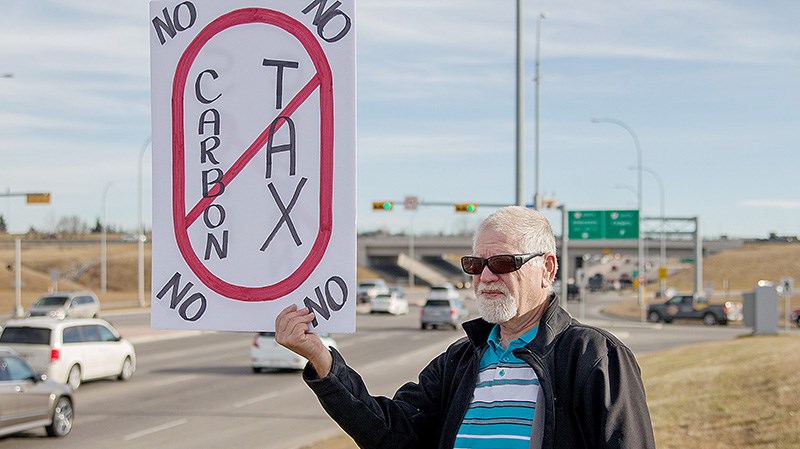Hundreds gathered in Airdrie November 5 to join with 12 locations across Alberta protesting the NDP’s carbon tax, set to start in 2017.
Airdrie protest co-coordinator Leah Hahn said she was pleased with the 415 signatures the community added to a petition calling for a referendum on the carbon tax.
In total, she said the Alberta-wide rallies collected an estimated 7,800 to 8,000 signatures for a Wildrose Party-backed petition. The petition requires 500,000 signatures before it can be brought to the legislature.
“We believe if enough Albertans exercise their voice that we will no longer be seen as the silent majority,” Hahn said.
Starting January 1, a carbon tax will be applied to fuels at a rate of $20 per tonne in Alberta. Provincial officials say it will cost the average Albertan $191 in 2017; however, Albertans with low incomes will be provided with rebates up to $200.
Airdrie resident and rally participant Robyn Buchart said she was protesting to have her voice heard.
She said she hoped the Alberta-wide rallies would get the NDP to hear the concerns of Albertans who oppose the tax.
“Taxes don’t turn down the world’s thermostat,” Buchart said. “Any other times we have our voice out there, the NDP clearly hasn’t heard us.”
Angela Pitt, Airdrie Wildrose MLA, said,“This [carbon] tax is literally taking away from hardworking Albertan families.”
Alberta Environment and Parks Minister Shannon Phillips said with carbon pricing now the law, the absence of an Alberta plan would mean one would be imposed on the province by Ottawa.
In response to those who would like to see the carbon tax scrapped entirely, Phillips said there would always be voices that want Alberta to be stuck in the past.
“Climate change is real, action on climate change is real [and] a carbon-constrained future is real,” Phillips said. “We need to make sure that we’ve got an Alberta solution to this problem.”
She said the NDP government is implementing the least intrusive method to price carbon while also making investments in the economy of tomorrow and creating jobs.
In response to the province-wide rallies, Phillips said it’s fair Albertans have questions about the impact of carbon pricing.
Prime Minister Justin Trudeau said he will impose a carbon tax on all provinces. The tax would start at $10 per tonne in 2018 and rise to $50 per tonne in 2022.
British Columbia’s existing carbon tax is currently $30 per tonne and translates to a 6.7 cent-per -litre tax on gasoline.
According to the Canadian Taxpayers Federation (CTF), the national carbon tax will cost the average household more than $2,500 annually, if implemented.
Premier Brian Pallister is considering a carbon tax for Manitoba, but Todd MacKay, Prairie director for the CTF, said it may not do much good in reducing global emissions.
“Manitoba produces 2.9 per cent of Canada’s total emissions. That means that eliminating all of Manitoba’s emissions completely would only reduce global emissions by 0.046 per cent,”MacKay noted in a recent column. “How much should Manitobans be forced to pay to produce an emission reduction that’s a rounding error in the global calculation?”
MacKay added that China and the United States aren’t imposing carbon taxes. Australia has already experimented with a carbon tax and repealed it, he said.
In Saskatchewan, the Saskatchewan Association of Rural Municipalities recently told a federal finance committee that a $40-per-tonne carbon tax would cost about $10,000 for a farmer working 2,500 acres.
Saskatchewan Premier Brad Wall has pledged to fight the carbon tax, alone if necessary.
The premier presented his case in stark terms.
“I believe in climate change,” said Premier Wall. “But I guess I am a denier – I’m a climate tax denier. I deny the fallacy that a new tax on Canadians whose CO2 emissions are 1.6 per cent of global emissions is the best way for Canada to help fight climate change.”



